An Analysis of Goods and Services Tax Impact on Battery Markets
VerifiedAdded on 2020/03/13
|9
|1478
|67
Report
AI Summary
This report analyzes the impact of the Goods and Services Tax (GST) on the battery market in India, exploring the implications for solar panel batteries, electric vehicles (EVs), and petrol vehicles. It examines the effects of lowering the GST levy from 28% to 5% on the solar industry, discussing both the potential benefits and concerns, such as the impact on project costs and import dependencies. The report also assesses how the GST reduction affects the EV market, highlighting the positive impacts of a uniform tax structure and the potential for increased customer adoption, while also addressing concerns about the tax rate. Furthermore, it evaluates the impact on the petrol vehicle market, suggesting a minimal effect due to the tax rate remaining largely unchanged. The report concludes by discussing the government's push towards a 100% EV nation by 2030, and the role that GST reduction on batteries plays in this initiative. It includes references to relevant studies and figures to support its analysis.
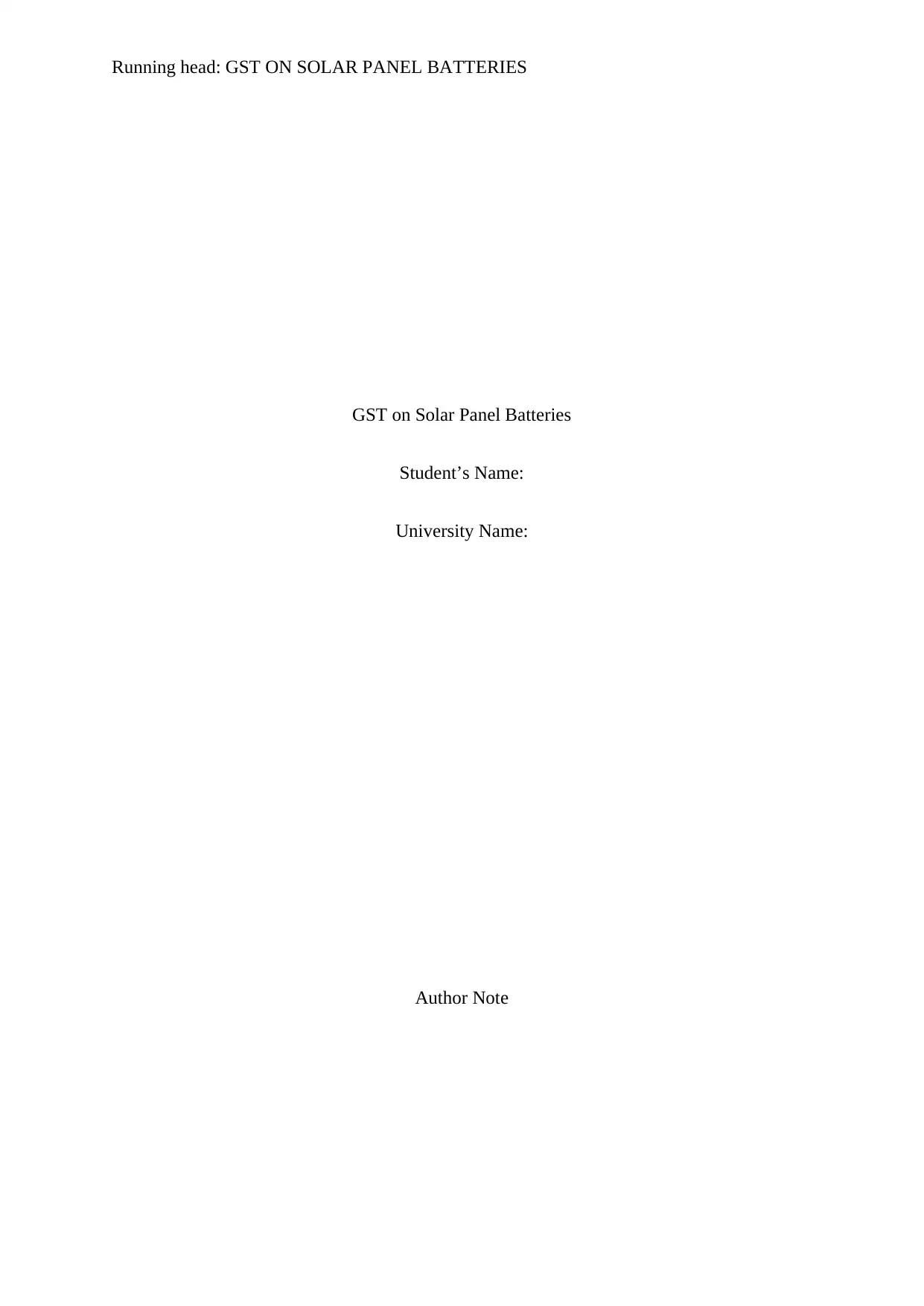
Running head: GST ON SOLAR PANEL BATTERIES
GST on Solar Panel Batteries
Student’s Name:
University Name:
Author Note
GST on Solar Panel Batteries
Student’s Name:
University Name:
Author Note
Paraphrase This Document
Need a fresh take? Get an instant paraphrase of this document with our AI Paraphraser

1GST ON SOLAR PANEL BATTERIES
Table of Contents
Question 1..................................................................................................................................2
Question 2..................................................................................................................................3
Question 3..................................................................................................................................5
Question 4..................................................................................................................................6
References..................................................................................................................................8
Table of Contents
Question 1..................................................................................................................................2
Question 2..................................................................................................................................3
Question 3..................................................................................................................................5
Question 4..................................................................................................................................6
References..................................................................................................................................8
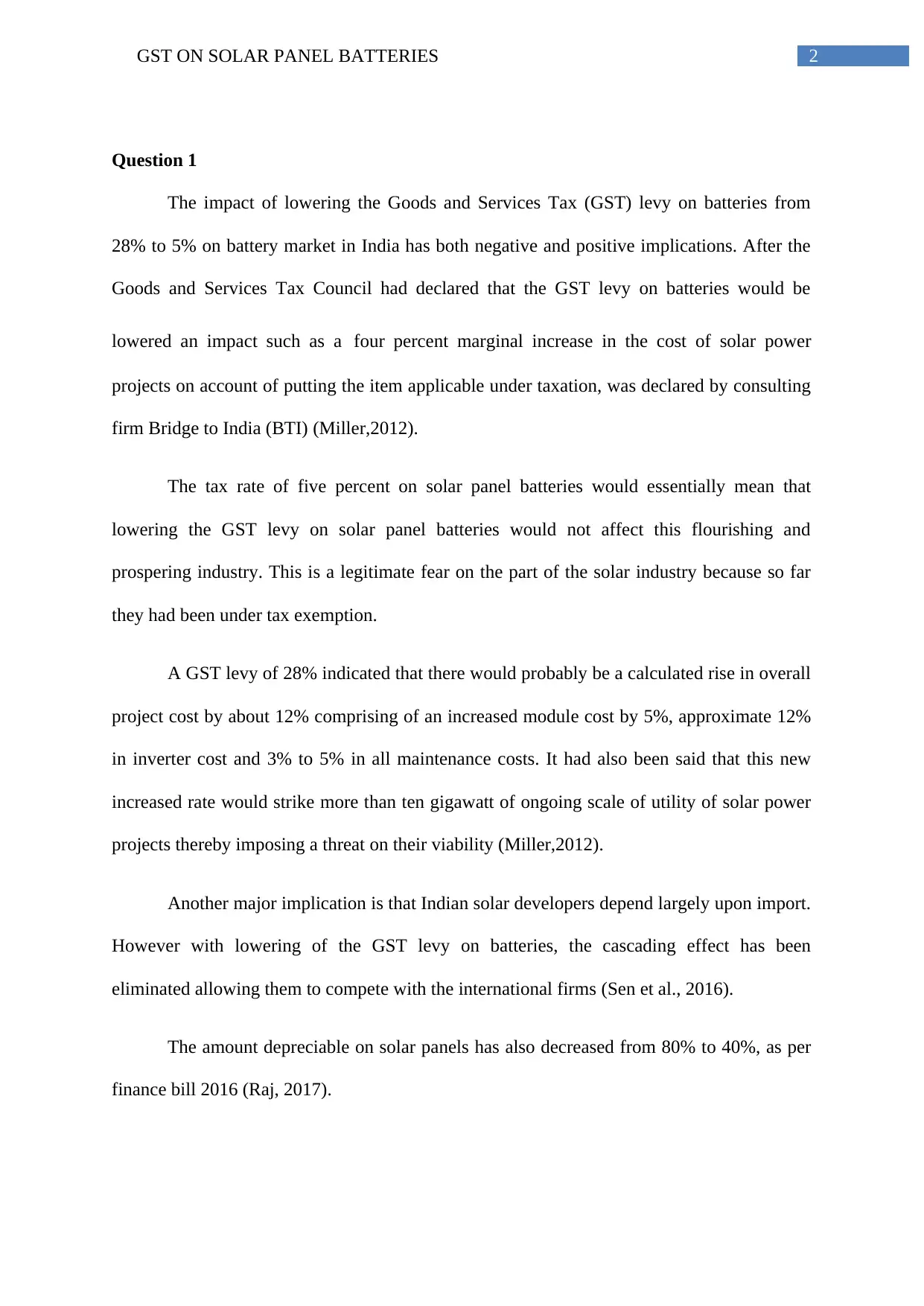
2GST ON SOLAR PANEL BATTERIES
Question 1
The impact of lowering the Goods and Services Tax (GST) levy on batteries from
28% to 5% on battery market in India has both negative and positive implications. After the
Goods and Services Tax Council had declared that the GST levy on batteries would be
lowered an impact such as a four percent marginal increase in the cost of solar power
projects on account of putting the item applicable under taxation, was declared by consulting
firm Bridge to India (BTI) (Miller,2012).
The tax rate of five percent on solar panel batteries would essentially mean that
lowering the GST levy on solar panel batteries would not affect this flourishing and
prospering industry. This is a legitimate fear on the part of the solar industry because so far
they had been under tax exemption.
A GST levy of 28% indicated that there would probably be a calculated rise in overall
project cost by about 12% comprising of an increased module cost by 5%, approximate 12%
in inverter cost and 3% to 5% in all maintenance costs. It had also been said that this new
increased rate would strike more than ten gigawatt of ongoing scale of utility of solar power
projects thereby imposing a threat on their viability (Miller,2012).
Another major implication is that Indian solar developers depend largely upon import.
However with lowering of the GST levy on batteries, the cascading effect has been
eliminated allowing them to compete with the international firms (Sen et al., 2016).
The amount depreciable on solar panels has also decreased from 80% to 40%, as per
finance bill 2016 (Raj, 2017).
Question 1
The impact of lowering the Goods and Services Tax (GST) levy on batteries from
28% to 5% on battery market in India has both negative and positive implications. After the
Goods and Services Tax Council had declared that the GST levy on batteries would be
lowered an impact such as a four percent marginal increase in the cost of solar power
projects on account of putting the item applicable under taxation, was declared by consulting
firm Bridge to India (BTI) (Miller,2012).
The tax rate of five percent on solar panel batteries would essentially mean that
lowering the GST levy on solar panel batteries would not affect this flourishing and
prospering industry. This is a legitimate fear on the part of the solar industry because so far
they had been under tax exemption.
A GST levy of 28% indicated that there would probably be a calculated rise in overall
project cost by about 12% comprising of an increased module cost by 5%, approximate 12%
in inverter cost and 3% to 5% in all maintenance costs. It had also been said that this new
increased rate would strike more than ten gigawatt of ongoing scale of utility of solar power
projects thereby imposing a threat on their viability (Miller,2012).
Another major implication is that Indian solar developers depend largely upon import.
However with lowering of the GST levy on batteries, the cascading effect has been
eliminated allowing them to compete with the international firms (Sen et al., 2016).
The amount depreciable on solar panels has also decreased from 80% to 40%, as per
finance bill 2016 (Raj, 2017).
⊘ This is a preview!⊘
Do you want full access?
Subscribe today to unlock all pages.

Trusted by 1+ million students worldwide
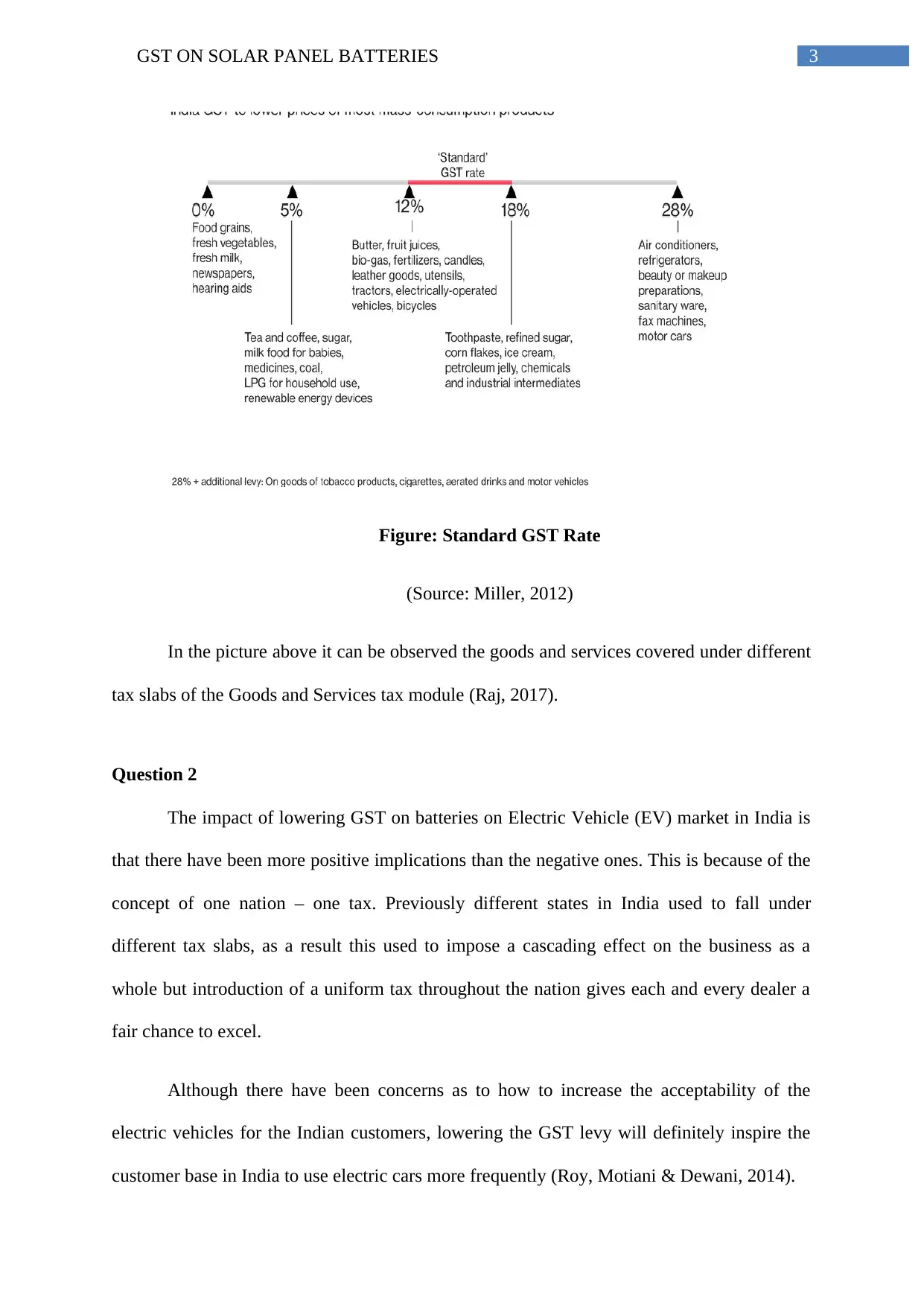
3GST ON SOLAR PANEL BATTERIES
Figure: Standard GST Rate
(Source: Miller, 2012)
In the picture above it can be observed the goods and services covered under different
tax slabs of the Goods and Services tax module (Raj, 2017).
Question 2
The impact of lowering GST on batteries on Electric Vehicle (EV) market in India is
that there have been more positive implications than the negative ones. This is because of the
concept of one nation – one tax. Previously different states in India used to fall under
different tax slabs, as a result this used to impose a cascading effect on the business as a
whole but introduction of a uniform tax throughout the nation gives each and every dealer a
fair chance to excel.
Although there have been concerns as to how to increase the acceptability of the
electric vehicles for the Indian customers, lowering the GST levy will definitely inspire the
customer base in India to use electric cars more frequently (Roy, Motiani & Dewani, 2014).
Figure: Standard GST Rate
(Source: Miller, 2012)
In the picture above it can be observed the goods and services covered under different
tax slabs of the Goods and Services tax module (Raj, 2017).
Question 2
The impact of lowering GST on batteries on Electric Vehicle (EV) market in India is
that there have been more positive implications than the negative ones. This is because of the
concept of one nation – one tax. Previously different states in India used to fall under
different tax slabs, as a result this used to impose a cascading effect on the business as a
whole but introduction of a uniform tax throughout the nation gives each and every dealer a
fair chance to excel.
Although there have been concerns as to how to increase the acceptability of the
electric vehicles for the Indian customers, lowering the GST levy will definitely inspire the
customer base in India to use electric cars more frequently (Roy, Motiani & Dewani, 2014).
Paraphrase This Document
Need a fresh take? Get an instant paraphrase of this document with our AI Paraphraser
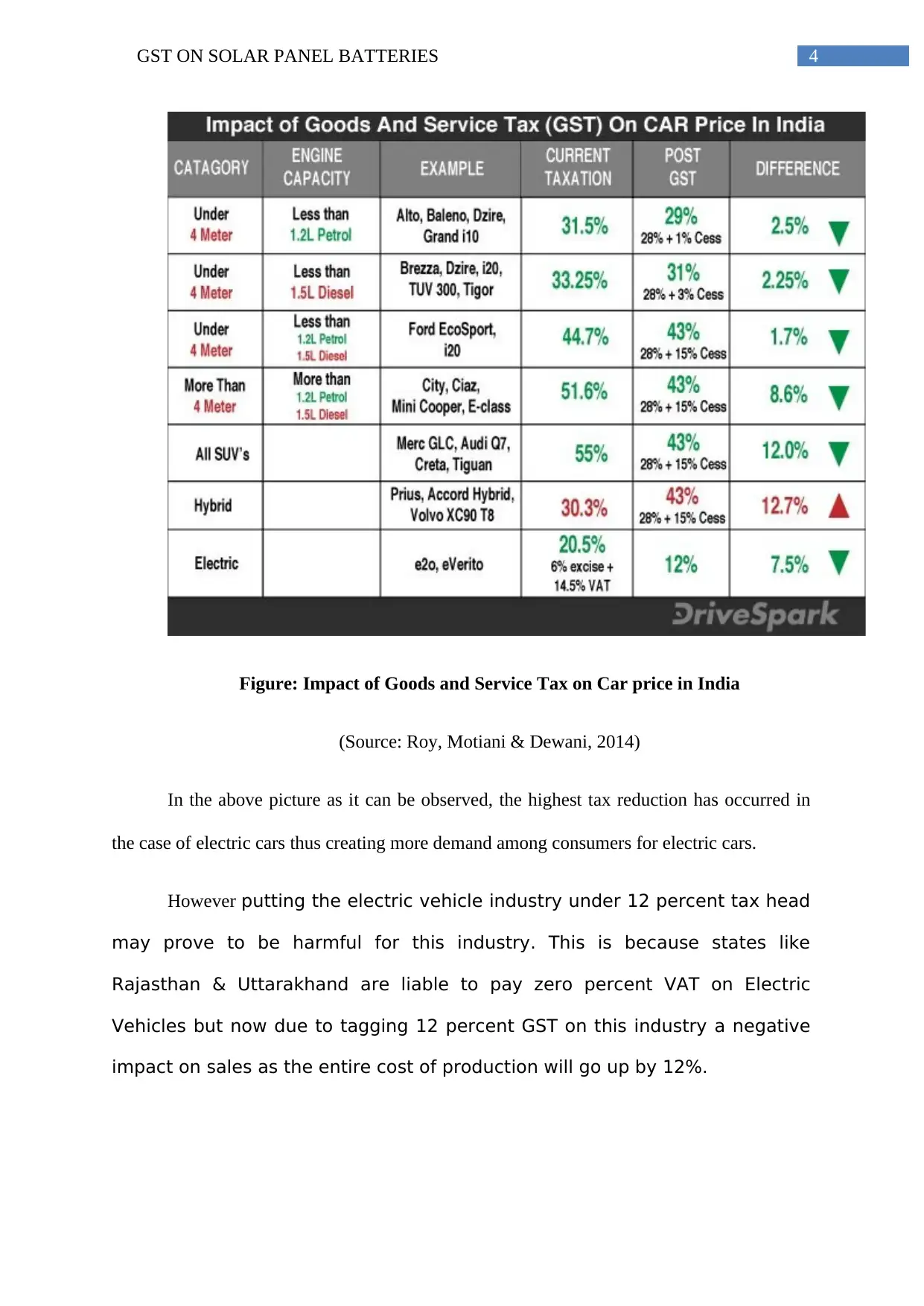
4GST ON SOLAR PANEL BATTERIES
Figure: Impact of Goods and Service Tax on Car price in India
(Source: Roy, Motiani & Dewani, 2014)
In the above picture as it can be observed, the highest tax reduction has occurred in
the case of electric cars thus creating more demand among consumers for electric cars.
However putting the electric vehicle industry under 12 percent tax head
may prove to be harmful for this industry. This is because states like
Rajasthan & Uttarakhand are liable to pay zero percent VAT on Electric
Vehicles but now due to tagging 12 percent GST on this industry a negative
impact on sales as the entire cost of production will go up by 12%.
Figure: Impact of Goods and Service Tax on Car price in India
(Source: Roy, Motiani & Dewani, 2014)
In the above picture as it can be observed, the highest tax reduction has occurred in
the case of electric cars thus creating more demand among consumers for electric cars.
However putting the electric vehicle industry under 12 percent tax head
may prove to be harmful for this industry. This is because states like
Rajasthan & Uttarakhand are liable to pay zero percent VAT on Electric
Vehicles but now due to tagging 12 percent GST on this industry a negative
impact on sales as the entire cost of production will go up by 12%.
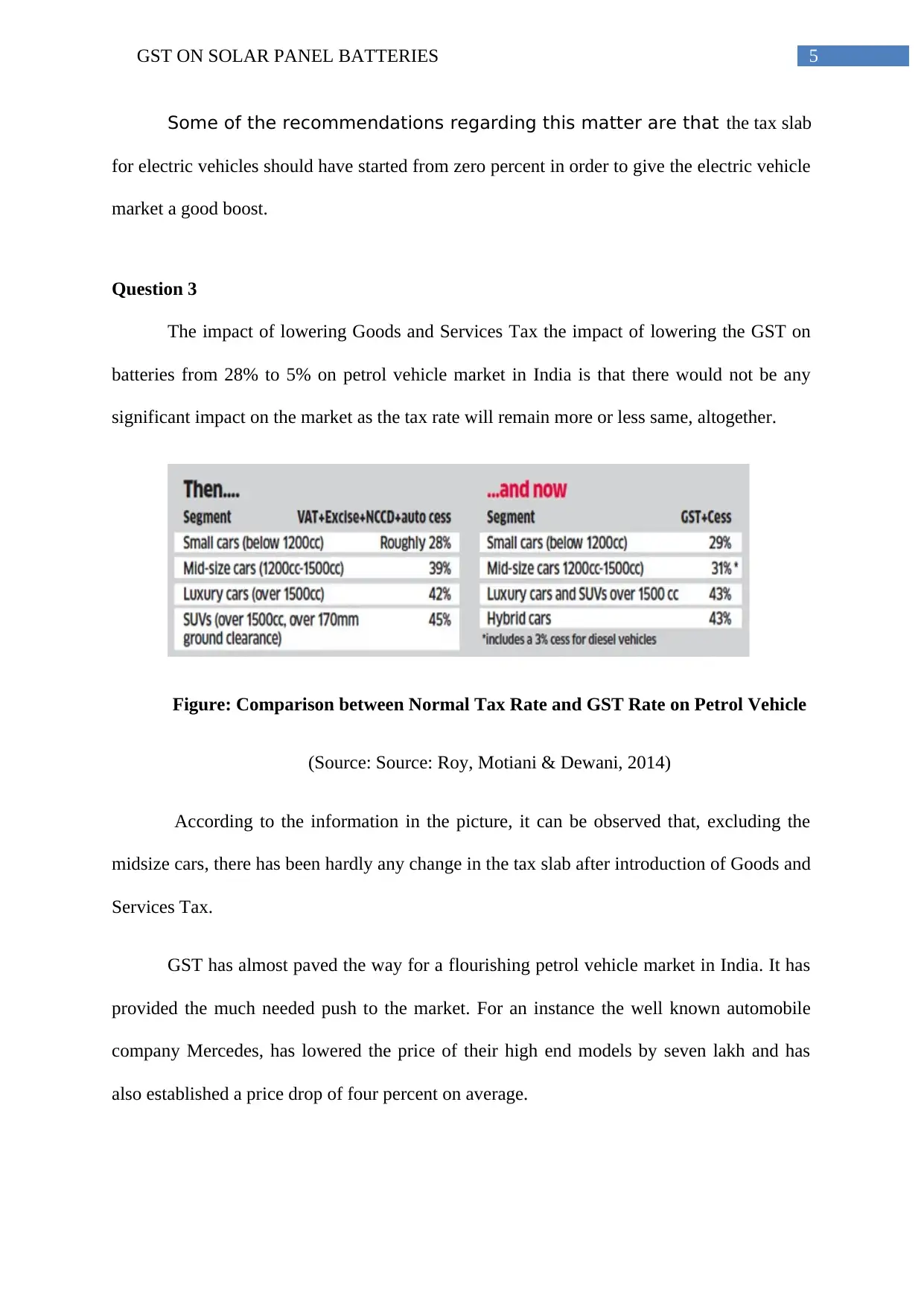
5GST ON SOLAR PANEL BATTERIES
Some of the recommendations regarding this matter are that the tax slab
for electric vehicles should have started from zero percent in order to give the electric vehicle
market a good boost.
Question 3
The impact of lowering Goods and Services Tax the impact of lowering the GST on
batteries from 28% to 5% on petrol vehicle market in India is that there would not be any
significant impact on the market as the tax rate will remain more or less same, altogether.
Figure: Comparison between Normal Tax Rate and GST Rate on Petrol Vehicle
(Source: Source: Roy, Motiani & Dewani, 2014)
According to the information in the picture, it can be observed that, excluding the
midsize cars, there has been hardly any change in the tax slab after introduction of Goods and
Services Tax.
GST has almost paved the way for a flourishing petrol vehicle market in India. It has
provided the much needed push to the market. For an instance the well known automobile
company Mercedes, has lowered the price of their high end models by seven lakh and has
also established a price drop of four percent on average.
Some of the recommendations regarding this matter are that the tax slab
for electric vehicles should have started from zero percent in order to give the electric vehicle
market a good boost.
Question 3
The impact of lowering Goods and Services Tax the impact of lowering the GST on
batteries from 28% to 5% on petrol vehicle market in India is that there would not be any
significant impact on the market as the tax rate will remain more or less same, altogether.
Figure: Comparison between Normal Tax Rate and GST Rate on Petrol Vehicle
(Source: Source: Roy, Motiani & Dewani, 2014)
According to the information in the picture, it can be observed that, excluding the
midsize cars, there has been hardly any change in the tax slab after introduction of Goods and
Services Tax.
GST has almost paved the way for a flourishing petrol vehicle market in India. It has
provided the much needed push to the market. For an instance the well known automobile
company Mercedes, has lowered the price of their high end models by seven lakh and has
also established a price drop of four percent on average.
⊘ This is a preview!⊘
Do you want full access?
Subscribe today to unlock all pages.

Trusted by 1+ million students worldwide
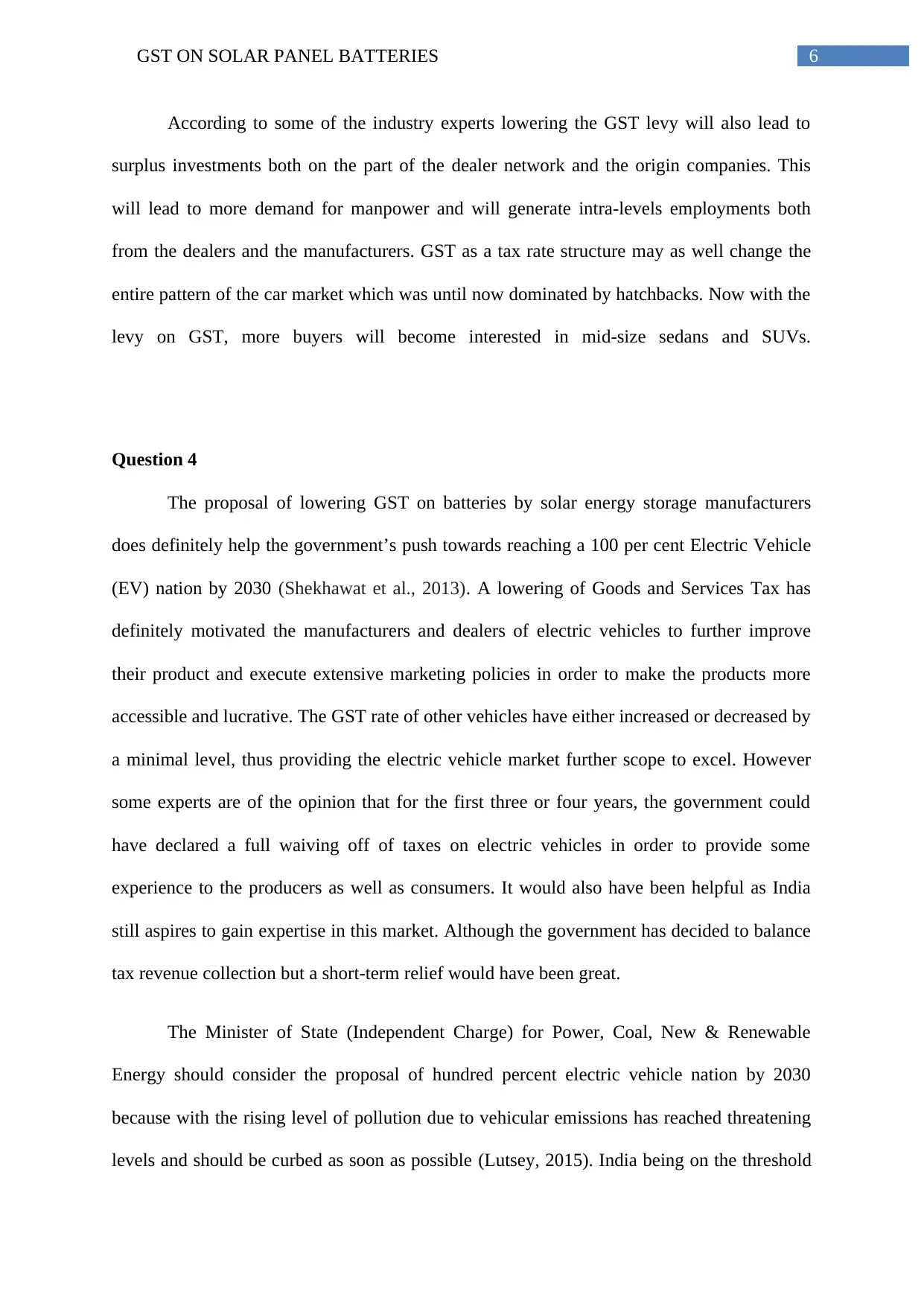
6GST ON SOLAR PANEL BATTERIES
According to some of the industry experts lowering the GST levy will also lead to
surplus investments both on the part of the dealer network and the origin companies. This
will lead to more demand for manpower and will generate intra-levels employments both
from the dealers and the manufacturers. GST as a tax rate structure may as well change the
entire pattern of the car market which was until now dominated by hatchbacks. Now with the
levy on GST, more buyers will become interested in mid-size sedans and SUVs.
Question 4
The proposal of lowering GST on batteries by solar energy storage manufacturers
does definitely help the government’s push towards reaching a 100 per cent Electric Vehicle
(EV) nation by 2030 (Shekhawat et al., 2013). A lowering of Goods and Services Tax has
definitely motivated the manufacturers and dealers of electric vehicles to further improve
their product and execute extensive marketing policies in order to make the products more
accessible and lucrative. The GST rate of other vehicles have either increased or decreased by
a minimal level, thus providing the electric vehicle market further scope to excel. However
some experts are of the opinion that for the first three or four years, the government could
have declared a full waiving off of taxes on electric vehicles in order to provide some
experience to the producers as well as consumers. It would also have been helpful as India
still aspires to gain expertise in this market. Although the government has decided to balance
tax revenue collection but a short-term relief would have been great.
The Minister of State (Independent Charge) for Power, Coal, New & Renewable
Energy should consider the proposal of hundred percent electric vehicle nation by 2030
because with the rising level of pollution due to vehicular emissions has reached threatening
levels and should be curbed as soon as possible (Lutsey, 2015). India being on the threshold
According to some of the industry experts lowering the GST levy will also lead to
surplus investments both on the part of the dealer network and the origin companies. This
will lead to more demand for manpower and will generate intra-levels employments both
from the dealers and the manufacturers. GST as a tax rate structure may as well change the
entire pattern of the car market which was until now dominated by hatchbacks. Now with the
levy on GST, more buyers will become interested in mid-size sedans and SUVs.
Question 4
The proposal of lowering GST on batteries by solar energy storage manufacturers
does definitely help the government’s push towards reaching a 100 per cent Electric Vehicle
(EV) nation by 2030 (Shekhawat et al., 2013). A lowering of Goods and Services Tax has
definitely motivated the manufacturers and dealers of electric vehicles to further improve
their product and execute extensive marketing policies in order to make the products more
accessible and lucrative. The GST rate of other vehicles have either increased or decreased by
a minimal level, thus providing the electric vehicle market further scope to excel. However
some experts are of the opinion that for the first three or four years, the government could
have declared a full waiving off of taxes on electric vehicles in order to provide some
experience to the producers as well as consumers. It would also have been helpful as India
still aspires to gain expertise in this market. Although the government has decided to balance
tax revenue collection but a short-term relief would have been great.
The Minister of State (Independent Charge) for Power, Coal, New & Renewable
Energy should consider the proposal of hundred percent electric vehicle nation by 2030
because with the rising level of pollution due to vehicular emissions has reached threatening
levels and should be curbed as soon as possible (Lutsey, 2015). India being on the threshold
Paraphrase This Document
Need a fresh take? Get an instant paraphrase of this document with our AI Paraphraser

7GST ON SOLAR PANEL BATTERIES
of development, in a short span of time is adapting to the fast paced lifestyle, thus the usage
of private vehicle is increasing day by day. Therefore the substitution of petrol or diesel based
vehicles with electric ones is a much valid proposal and should be considered with utmost
importance. To understand in a better the picture below, may be considered.
Figure: Sustainable Development Goals
(Source: Lutsey, 2015)
of development, in a short span of time is adapting to the fast paced lifestyle, thus the usage
of private vehicle is increasing day by day. Therefore the substitution of petrol or diesel based
vehicles with electric ones is a much valid proposal and should be considered with utmost
importance. To understand in a better the picture below, may be considered.
Figure: Sustainable Development Goals
(Source: Lutsey, 2015)
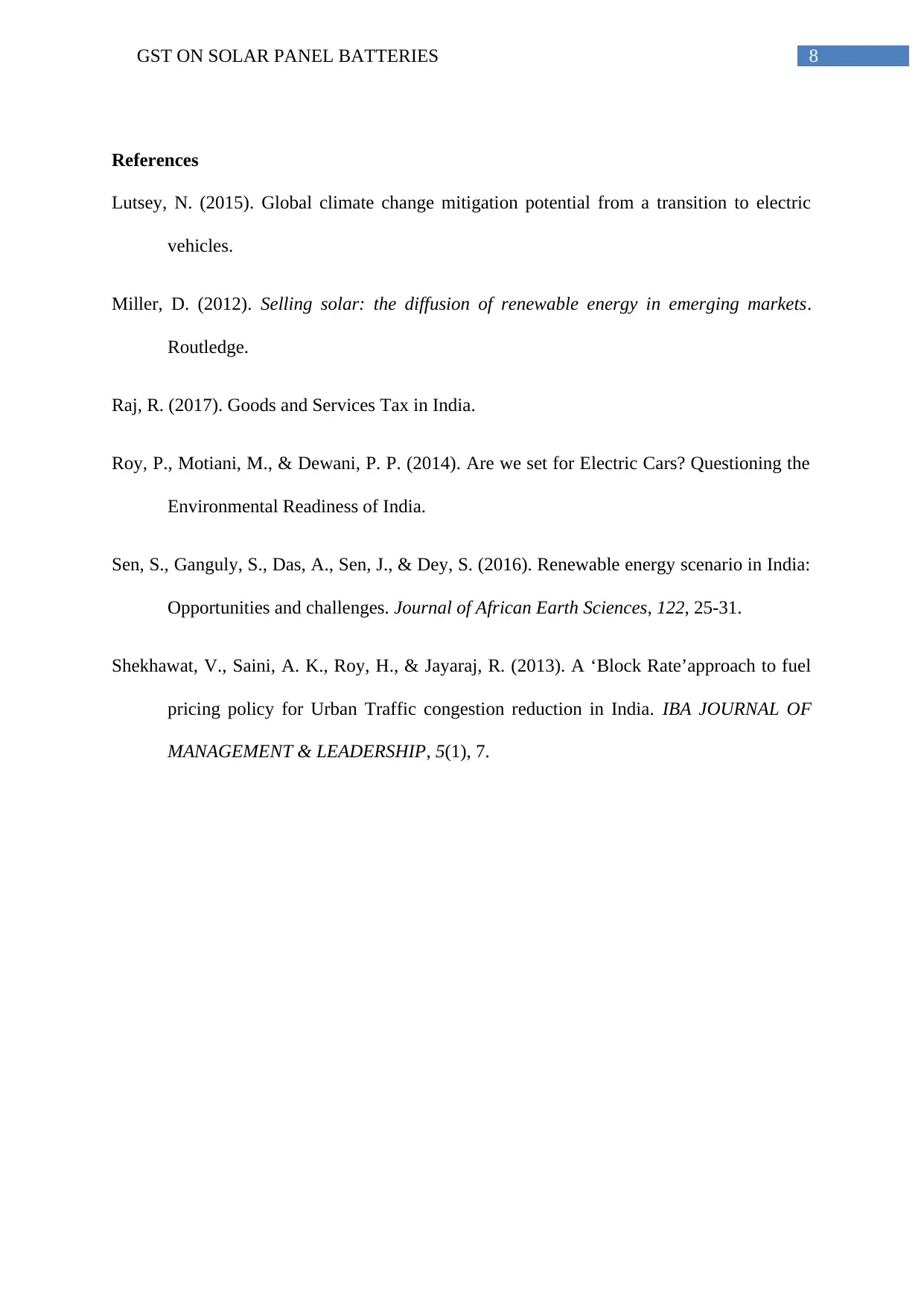
8GST ON SOLAR PANEL BATTERIES
References
Lutsey, N. (2015). Global climate change mitigation potential from a transition to electric
vehicles.
Miller, D. (2012). Selling solar: the diffusion of renewable energy in emerging markets.
Routledge.
Raj, R. (2017). Goods and Services Tax in India.
Roy, P., Motiani, M., & Dewani, P. P. (2014). Are we set for Electric Cars? Questioning the
Environmental Readiness of India.
Sen, S., Ganguly, S., Das, A., Sen, J., & Dey, S. (2016). Renewable energy scenario in India:
Opportunities and challenges. Journal of African Earth Sciences, 122, 25-31.
Shekhawat, V., Saini, A. K., Roy, H., & Jayaraj, R. (2013). A ‘Block Rate’approach to fuel
pricing policy for Urban Traffic congestion reduction in India. IBA JOURNAL OF
MANAGEMENT & LEADERSHIP, 5(1), 7.
References
Lutsey, N. (2015). Global climate change mitigation potential from a transition to electric
vehicles.
Miller, D. (2012). Selling solar: the diffusion of renewable energy in emerging markets.
Routledge.
Raj, R. (2017). Goods and Services Tax in India.
Roy, P., Motiani, M., & Dewani, P. P. (2014). Are we set for Electric Cars? Questioning the
Environmental Readiness of India.
Sen, S., Ganguly, S., Das, A., Sen, J., & Dey, S. (2016). Renewable energy scenario in India:
Opportunities and challenges. Journal of African Earth Sciences, 122, 25-31.
Shekhawat, V., Saini, A. K., Roy, H., & Jayaraj, R. (2013). A ‘Block Rate’approach to fuel
pricing policy for Urban Traffic congestion reduction in India. IBA JOURNAL OF
MANAGEMENT & LEADERSHIP, 5(1), 7.
⊘ This is a preview!⊘
Do you want full access?
Subscribe today to unlock all pages.

Trusted by 1+ million students worldwide
1 out of 9
Your All-in-One AI-Powered Toolkit for Academic Success.
+13062052269
info@desklib.com
Available 24*7 on WhatsApp / Email
![[object Object]](/_next/static/media/star-bottom.7253800d.svg)
Unlock your academic potential
Copyright © 2020–2026 A2Z Services. All Rights Reserved. Developed and managed by ZUCOL.

